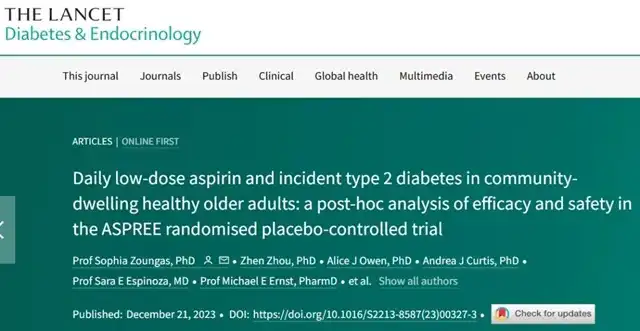Aspirin’s Pros and Cons in Preventing Diabetes among the Elderly
- Normal Liver Cells Found to Promote Cancer Metastasis to the Liver
- Nearly 80% Complete Remission: Breakthrough in ADC Anti-Tumor Treatment
- Vaccination Against Common Diseases May Prevent Dementia!
- New Alzheimer’s Disease (AD) Diagnosis and Staging Criteria
- Breakthrough in Alzheimer’s Disease: New Nasal Spray Halts Cognitive Decline by Targeting Toxic Protein
- Can the Tap Water at the Paris Olympics be Drunk Directly?
Aspirin’s Pros and Cons in Preventing Diabetes among the Elderly Revealed in a Clinical Trial
- Should China be held legally responsible for the US’s $18 trillion COVID losses?
- CT Radiation Exposure Linked to Blood Cancer in Children and Adolescents
- FDA has mandated a top-level black box warning for all marketed CAR-T therapies
- Can people with high blood pressure eat peanuts?
- What is the difference between dopamine and dobutamine?
- How long can the patient live after heart stent surgery?
Aspirin’s Pros and Cons in Preventing Diabetes among the Elderly Revealed in a Clinical Trial
A recent clinical trial involving tens of thousands of participants has shed light on the potential benefits and risks of using aspirin as a preventive measure against diabetes in the elderly.
The study, known as the ASPREE trial, analyzed five years of follow-up data from over 16,000 individuals, revealing that low-dose aspirin can reduce the risk of developing type 2 diabetes by 15%. However, it also showed a 44% increase in the risk of major bleeding events.
Type 2 diabetes is becoming a significant health challenge, particularly among the elderly, with approximately one-fourth of individuals aged 75-79 affected.
Given the higher exposure and poorer health conditions of older adults, the threat posed by the disease is even greater.
Inflammation plays a crucial role in the onset and progression of diabetes, leading researchers to explore immune modulation as a potential avenue for prevention and treatment.
Aspirin, an affordable and widely available anti-inflammatory drug, has been considered for use in preventing diabetes among the elderly.
The ASPREE trial, a randomized, placebo-controlled study, aimed to evaluate whether low-dose enteric-coated aspirin (100mg/day) could prolong disability-free survival in older adults. Conducted in Australia and the United States, the study included individuals aged 70 and above, with the age criterion lowered to 65 for participants belonging to minority ethnic groups in the U.S.

Previous reports from ASPREE indicated that, unfortunately, aspirin did not extend disability-free survival compared to the placebo. The aspirin group showed a 14% increase in overall mortality, with a 38% higher rate of major bleeding events, primarily gastrointestinal bleeding. Subgroup analysis also revealed a higher incidence of falls among aspirin group participants.
The newly released data analyzed information from 16,209 participants in the ASPREE trial, with a median follow-up period of 4.7 years. The participants had a median age of 73.9 years, a median BMI of 27.8, and a fasting blood glucose level of 5.3mmol/L. 72.8% of participants had hypertension, and 64.8% had lipid abnormalities.
Throughout the follow-up period, 72.7% of participants had a compliance rate of over 50%, with 51.6% achieving a compliance rate of 85% or higher.
During the follow-up, the aspirin group exhibited a lower risk of being diagnosed with diabetes, with a 15% reduction compared to the placebo group. The difference in the number of cases became apparent in the second year of treatment, as seen in the cumulative incidence curve.
Additionally, male participants experienced a greater reduction in the incidence rate by -3.9/1000 person-years compared to -0.8/1000 person-years in females, indicating greater benefits for men.
As participants aged, both the aspirin and placebo groups showed an increase in fasting glucose levels, but the aspirin group’s increase was less pronounced.
Unfortunately, aspirin’s side effects were evident, with 3.7% of the aspirin group experiencing major bleeding events at an average rate of 8.2 events per 1000 person-years, compared to 2.6% in the placebo group with an average rate of 5.7 events per 1000 person-years. As compared to the placebo, aspirin treatment increased the risk of major bleeding by 44%.
Regrettably, the study did not include testing for C-reactive protein and other inflammatory markers, limiting the ability to conduct mechanistic analyses.
In summary, aspirin does provide some assistance in preventing diabetes among the elderly, but it simultaneously poses additional risks. Further research to identify populations that would benefit more from aspirin use would facilitate better-informed treatment decisions, weighing the pros and cons effectively.
Aspirin’s Pros and Cons in Preventing Diabetes among the Elderly Revealed in a Clinical Trial
References:
[1]https://www.thelancet.com/journals/landia/article/PIIS2213-8587(23)00327-3/fulltext
[2]https://www.thelancet.com/journals/landia/article/PIIS2213-8587(23)00363-7/fulltext
(source:internet, reference only)
Disclaimer of medicaltrend.org
Important Note: The information provided is for informational purposes only and should not be considered as medical advice.



